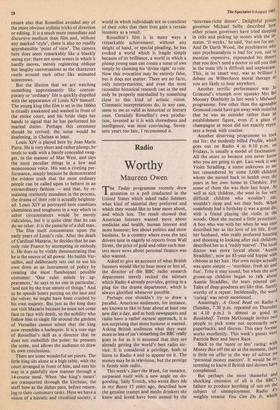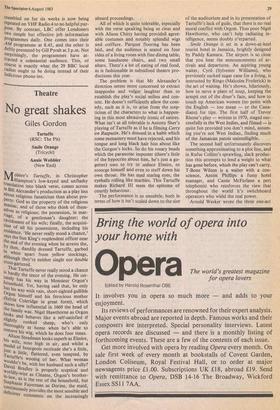Radio
Worthy
Maureen Owen
The Today programme recently drew attention to a poll conducted in the United States which asked radio listeners what kind of material they preferred and which they would like to hear more about, and which less. The result showed that American listeners wanted more about medicine and health, human interest and more humour; less about politics and show business. In a country where even the taxi drivers tune in eagerly to reports from Wall Street, the price of gold and other such mat- ters more news about personal finance was also wanted. Asked to give an account of what British listeners would like to hear more or less of, the director of the BBC radio research department merely recited the mixture which Radio 4 already provides, getting in a plug for the drama department, which is always glorified whenever possible. Perhaps one shouldn't try to draw a parallel. American audiences, for instance, are known to like to hear about at least one new diet a day, and as both newspapers and radio have a rather earnest approach, it is not surprising that more humour is wanted. Asking British audiences what they want more or less of isn't something the BBC really goes in for as it is assumed that they are already getting the world's best radio ser- vice. It is considered a privilege, both to listen to Radio 4 and to appear on it. The money may be in television, but the prestige is firmly with radio. This week's Start the Week, for instance, surpassed itself with a new angle on do- gooding. Sally Trench, who wrote Bury Me in my Boots 15 years ago, described how the genuine tramps and meths drinkers she knew and loved have been ousted by the `nouveau-riche dosser'. Delightful prison governor Michael Selby described how other prison governors have tried sleeping in cells and picking up stones with the in; mates. 'It works,' he said, 'but not for me. And Dr Garth Wood, the psychiatrist who says psychoanalysis is bad for you, not to mention expensive, expounded his theory that you don't need a doctor to tell you that in the main life is difficult and unpleasant, This, in its smart way, was as brilliant debate on Wilberforce moral therapy as you are likely to hear anywhere. Another terrific performance was Jo Grimond's triumph over squeaky Mrs Bel Mooney Dimbleby in last week's Midweek programme. Few other than the agreeable Grimond could have got away with insisting that he was an outsider rather than an establishment figure, even if a glass of champagne at noon did not exactly repre- sent a break with routine. Another deserving programme to look out for: the modestly billed Profile, which goes out on Radio 4 at 8.10 p.m. on Fridays, is usually a model of fascination, All the more so because you never know who you are going to get. Last week it was Violet Stradling, a name unknown to Me but remembered by some 2,000 children whom she nursed back to health over the years in her own home in Cheshire. For some of them she was their last hope. As well as sick children, she went in for very difficult children who wouldn't eat, wouldn't sleep and wet their beds. When somebody had a birthday it was a great do, with a friend playing the violin in the woods. Once she nursed a little prostitute. A boy who was with her when he was nine described her as the love of his life, Even her husband, who really preferred hunting and shooting to looking after sick children, described her as a 'ruddy marvel'. The local doctor was more lyrical about 'Auntie Straddles', now an 83-year-old hippie with ribbons in her hair. Her own recipe actually was quite simple — 'sunshine, fresh air and fun'. Trite it may sound, but when the now grown-up children began to talk about Auntie Straddles, the tears poured out. Tales of deep goodness are like that, SurelY worthy of a repeat. Incidentally, the word `caring' was never mentioned. Amazingly, A Good Read on Radio 4 (Sunday, 7.30 p.m. repeated on Thursday at 4.10 p.m.) is almost as good as Bookshelf. TereSa McGonagle invites two people to pick some not necessarily new paperbacks, and discuss. This easy format works excellently. This week's guests were Patricia Beer and Steve Race. Back to the 'more or less' rating: with Money Box off the air at the moment, there is little on offer in the way of advice on `personal money matters'. It would be in' teresting to know if British taxi drivers have complained. But perhaps the most shameful and shocking omission of all is the BBC 5 failure to produce anything of use on the subject of unemployment. Radio 4's weighty treatise You Can Do It, which
stumbled on for six weeks is now being repeated on VHF Radio 4 to no helpful pur- pose. By contrast, LBC offer Londoners two simple but effective job information programmes daily. One comes into their AM programme at 8.45, and the other is deftly presented by Gill Pyrah at 3 p.m. Not surprisingly, the programmes have at- tracted a substantial audience. This, of course is exactly what the 29 BBC local radios ought to be doing instead of their ludicrous phone-ins.







































 Previous page
Previous page